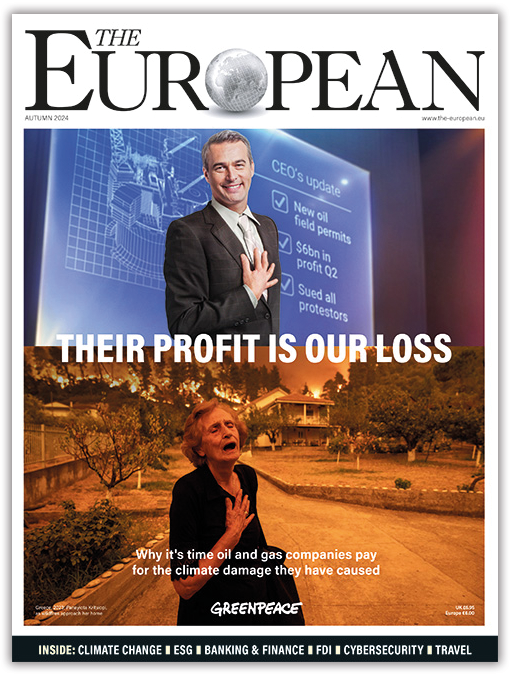Formerly one of the UK’s top paediatricians, retired doctor Colin Stern has reinvented himself as a prolific author of children’s and adult’s books. Between the two careers, one thing remains true: a commitment to make people feel better
Across a distinguished four-decade career, paediatrician Dr Colin Stern was responsible for making thousands of children—and their anxious families—feel better.
Based at Guy’s and St Thomas’ Hospital (GSTT) in central London, he would often encounter unusual medical cases that had stumped his fellow doctors and which had been referred expressly to him.
There was, for instance, the curious case of a teenager who daydreamed too much, a little girl who objected to long walks, a baby who inexplicably wouldn’t stop crying, and a young boy who said that his tummy was talking to him at night.
Colin’s vast experience coupled with a detective’s powers of observation enabled him to get to the root of the issue, however bizarre it may first appear, swiftly and in the majority of cases there was a happy outcome for the young patient.
Sometimes, however, there was simply nothing that medical science could do to help, and which would necessitate the most difficult and dreaded of conversations with parents.
But whatever the scenario, Colin evidenced an impeccable bedside manner, a skill honed over many years in practice.
It is this same quality—the gift of empathy, warmth, and understanding—which is immediately noticed in his ‘new’ career, as an author.
Now in his eighties, Colin retired from medicine in 2006, having risen to be Clinical Director of Paediatrics at Guy’s.
The free time was well spent on travel and his sporting interests, such as golf and fencing, but ever since his youth he had been drawn to creative writing and one day planned to pursue this further.
The catalyst finally came in 2020, with the tragic passing of his wife Ann, whom he’d been married to for over 40 years and whom he’d cared for in those last few years as she battled with a rare form of dementia.
In the midst of his grief, he took to expressing his pain through poetry. At first, this was a purely cathartic exercise but, as a body of work came together, he thought to collect and release it to help others also going through the grieving process.
This tender and moving collection, A Catafalque for Ann, came out in 2021 and with it, the former doctor had caught that most incurable of conditions … the writing bug.
It was soon followed by something a world away—a children’s fairytale adventure, Never-my-name and Isn’t-my-name: naughty fairy twins—which had been ‘commissioned’ by one of his grandchildren, based on tall bedtime stories he’d regaled her with when younger.
Sticking to poetry, Sailor-Y-Pent came next, a saucy comic narrative poem set in a fictional Welsh seaside town during the 1960s, like Dylan Thomas’ Under Milk Wood if made as a Carry On film.
Colin’s latest release continues the genre-hopping approach with a medical memoir, Listening to Mother, which brings together some of his most memorable and unusual cases encountered as a paediatrician.

With a lyrical prowess that dances between the realms of imagination and reality, Colin Stern has the unique ability to craft stories and poems that resonate with readers of all ages. His words possess a timeless quality, transporting you to far-off worlds, magical realms, and exploring the depths of human emotions.
“It’s the antithesis of the modern medical memoir,” says Colin, “in the sense that most books of this kind are highly negative and critical of the NHS.
“Our National Health System’s struggles have been well documented in the press but rarely do we read about the flipside, of doctors working tirelessly to help patients.
“For that reason, I thought it important to share my memoires, providing a book that will reassure parents of sick children and make for interesting reading for everyone else.”
He continued: “I certainly came across some unusual and knotty cases during my career but I always aimed to put a smile on my patients’ faces, and those of their parents.
“The doctor-patient relationship has always been central to the best outcome and continues to be so, though admittedly it must be more challenging for young doctors these days when there is so much more bureaucracy to deal with, eating into their time with patients.”
The huge demands placed on doctors’ shoulders these days is something that Colin is very sympathetic towards, having helped shape the careers of the next generation of doctors while serving as a postgraduate dean at Guy’s.
He also worked closely with doctors seeking new treatments for childhood diseases, running a research team and laboratory at the Rayne Institute, St. Thomas’ Hospital.
But despite all the demands on his time—regularly working 70-hour weeks—he never stepped away from seeing young patients.
“Oh no, I couldn’t have done that,” he protests. “It was simply too much fun, and so rewarding.
“Of course, there were sad moments—that’s just the reality of life—but to be able to take a sick child and make them better again so they can get on with what’s important, enjoying their childhood, meant the world to me, and it still does.”
It’s understandable, then, that his current writing projects include numerous children’s books among them, including poetry collections A Children’s Charivari and The Disappearing Dodo and Other Awkward Avians.
“Poetry is, perhaps, my favourite form of writing. This was nurtured in me from my school days, when I belonged to the literary society and received feedback on my work from the greats poets such as Siegfried Sassoon, John Betjeman and Louis MacNiece.
“Poetry is especially important for children as it helps with the development of language. I’m an unashamed traditionalist, in the sense that I like poems to rhyme, but that, to me, makes sense.
“Rhyming verse has an inherent bounce to the words which makes it entertaining to read, and hooking the young reader’s attention is important, otherwise they won’t engage with it however worthy it may be.
“I’m particularly excited about releasing The Disappearing Dodo and Other Awkward Avians. It’s a catalogue of fantastical birds including The Biscuit Hopper, The Picassowary, The Electric Rail, and The Disappearing Dodo.
“If young readers have half as much fun reading it as I did in writing it then I’ll be a very happy man!”
For his new children’s titles, Colin is once again working with talented illustrator Emily Luke, who brought his fairytale adventure Never-my-name and Isn’t-my-name: naughty fairy twins.
“She’s brilliant,” he enthuses. “I was introduced to her while writing Never-my-name and I’ve never looked back.
“Her work is magical and really brings my writing to life. I’ve been honoured to have Never-my-name described as a modern classic by readers and that in no small way is thanks to Emily.
“To think that my humble books could be entertaining readers for generations to come is as delightful a thought as having helped improve the lives of so many children during my time as a doctor.”
All of Colin Stern’s books – Listening to Mother, A Catafalque for Ann, Never-my-name and Isn’t-my-name, and Sailor-y-Pent – are published through Brown Dog Books and can be purchased on Amazon. Visit www.ColinStern.co.uk
Q&A Interview With Author Colin Stern
We catch up with retired paediatrician turned author Colin Stern to learn more about his distinguished medical career and swapping doctor’s notes for entertaining and absorbing poetry and prose

Q. What would you view as your greatest achievement in your medical career, and why?
A. Becoming an experienced and quite good clinician. That doesn’t sound very dramatic, but eventually one reaches a point is one’s career when others seem to recognise that you have acquired considerable skill in sorting out complex medical problems and that is very satisfying.
Q. You share some of your more unusual medical cases in memoir Listening to Mother. What do you think readers will gain from reading it?
A. I hope they gain reassurance. Recent medical books, such as Adam Kaye’s This is Going to Hurt, paint a picture of the NHS as not functioning very well. I think that’s not usually the case and my book, Listening to Mother, is, I believe, much more positive about it.
Q. Listening to Mother reflects a different time. How do you think the relationship between doctor and patient has changed since you first entered the profession? Is this a good or bad thing?
A. While medical practice has changed a lot, there has been less change in paediatrics. This is because, in what is always family medicine and in which you are dealing with parents, if you are a poor communicator, you might as well do something else. Consequently, relationships between doctor, patient, and parents have nearly always been very good. The other disciplines have been catching up!
Q. How challenging has it been transitioning from doctor to author? What do you find most satisfying in your writing career?
A. It wasn’t really a transition at all. I have always enjoyed writing, but medicine is a demanding profession and there have been periods when I was juggling as many as five different roles simultaneously. Writing to a back seat for a long time. Then I spent more than five years nursing my wife and the shock of her death triggered me back into writing.
Q. What would you say have been the greatest influences on your writing style?
A. As a child, I met T. S. Eliot, Siegfried Sassoon, Louis McNiece and John Betjeman, all heroes of mine today. My taste in authors is very wide. from Rudyard Kipling to WH Auden, from Virginia Woolf to Kasuo Ishiguro, from Ernest Hemingway to Samuel Beckett. If these is a page with writing on it, I’ll read it and only put it down if it’s poorly written. I owe everything I have written to them and to the fact that I read them, mostly, when I was quite young.

Dr Colin Stern’s latest book is medical memoir Listening to Mother, which brings together some of his most memorable and unusual cases encountered as a paediatrician.
Q. If you had to pick between poetry, children’s fiction, and adult-orientated fiction, which would you select and why?
A. I really enjoy writing for children most, but two thirds of my poems are for adults and I am part way through a novel for adults. I do like to write comic verse and to use fantastical themes. There seems to me to be little of that sort of poetry around at the moment. However, I am happy writing anything. Writing is writing, I think.
What did you find most satisfying in your medical career, and likewise your writing career?
A. By far the best thing about being a paediatrician is working with children. It’s also true that those one works with are virtually always lovely people. I had a wonderful career in medicine. I was very lucky. Although I wrote little while I was working as a paediatrician, that was purely because I was very busy. Now I am retired, writing gives me lots of pleasure and, I hope, my writings will do the same for other people.
What is likely to be the next book you publish, and why are you excited about it?
A. One book, The Disappearing Dodo and Other Awkward Avians, is almost complete and will be published in the next few months. It’s a rather strange collection of poems about peculiar birds, such as The Ink Lark and the Picassowary. Some are funny and some are a bit savage, but I think readers will find them a lot of fun.
After that, I’m preparing a collection of children’s verse, called A Children’s Charivari, and a saga for children called The Rainbow Mace. These are all written and await only illustrations.






